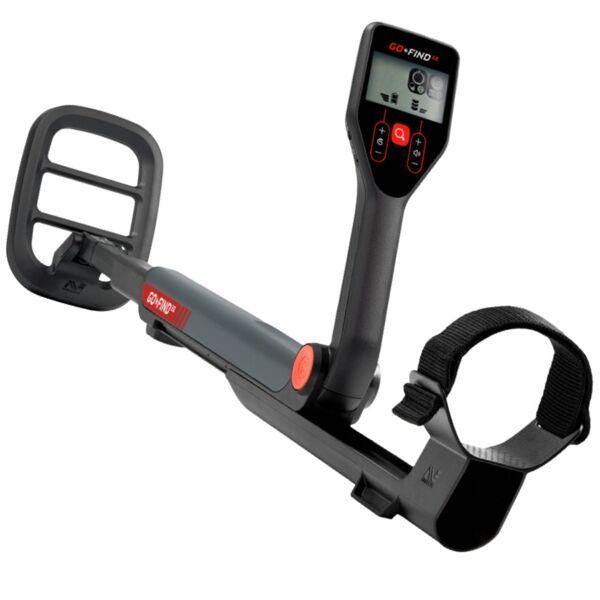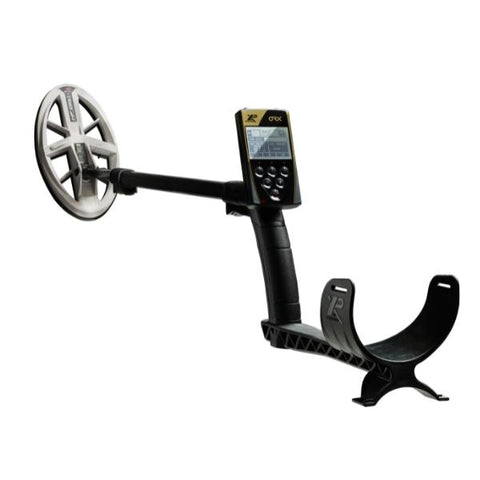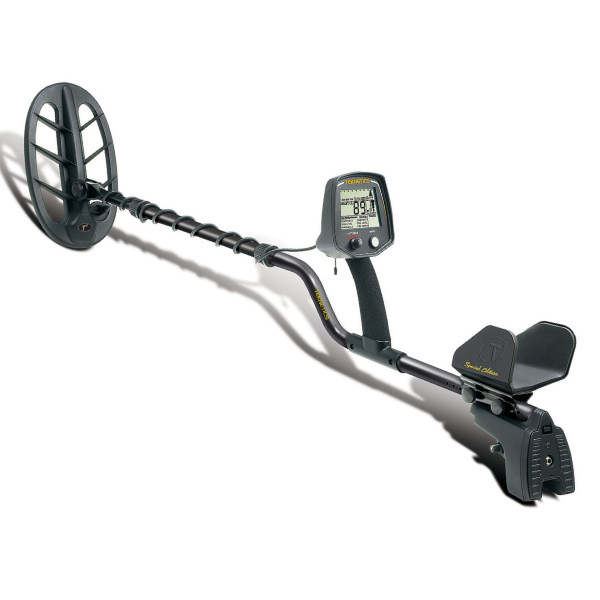
Have you always wanted to try your hand at metal detecting but weren’t sure where to start? In this guide you will learn everything you need to know about how choose the best metal detector for a beginner, types of metal detectors available, the best metal detectors for kids and adults, top 20 metal detecting tips and other detector facts to help you get started or grow your developing skills. Even if you are a seasoned detectorist, you may learn something new about this amazing hobby.
But before we delve into the nitty gritty, let’s have a quick look at who created the first commercial handheld metal detector as we know them today.
The First Commercial Metal Detector For Treasure and Gold Detecting
The first commercially designed handheld and portable metal detector was created in 1925 by a man by the name of Gerhard Fischer. To those of you already into metal detecting, that name might sound familiar. For those of you who haven’t heard of him, here is a brief overview.

Dr Fischer, spelled Fisher today, was a German immigrant living in California, USA. From his humble home garage he started Fisher Research Labs (est.1931), the oldest metal detecting company in the world. Along with his four employees, he developed the first patented metal detector, the Metallascope, or M-scope for short. The M-Scope’s popularity rapidly grew and soon Dr Fisher and his small team moved his garage production line into his very first factory.
Dr Fisher was passionate about his metal detectors and while that was his main drive, he is also famed for producing highly advanced electrical products such as Geiger counters, radio communication systems, voltage detectors and cable fault locators.
Dr Fisher retired in 1967 and in 2006 Fisher Research Labs was acquired by First Texas Holdings Corporation. Today, they are still one the largest manufacturers of high quality metal detectors, which include brands such as Teknetics, Bounty Hunter and Fisher Metal Detectors.

Modern Day Metal Detectors
Metal detectors have come a long way since the early days. With technology ever changing and more manufacturers entering the market, the envelope of quality, depth and accuracy is constantly being pushed.
Today, metal detectors are increasingly becoming lighter, more energy efficient, and have a variety of built-in features to make metal detecting a hobby that people of all ages and experience levels can enjoy.
What are the most common Metal Detectors used today?
There are two main types of metal detectors - Pulse Induction metal detectors (or PI) and VLF metal detectors, which stands for Very Low Frequency. Let's first talk about VLF metal detectors.
VLF Metal Detectors
VLF metal detectors run on lower frequencies compared to Pulse Induction metal detectors. These frequencies typically start at around 6kHz for coin and treasure hunting metal detectors and 13kHz and above for VLF multi-purpose metal detectors capable of finding gold.
VLF metal detectors have come a very long way since their inception. Modern VLF metal detectors are what you will generally see people use on beaches, fields and parks looking for old coins, jewellery and lost treasures. While VLF metal detectors are well known for coin and treasure detecting, models that run at higher frequencies and have features such as All Metal Mode, Gain/Sensitivity, Threshold and Ground Balance Functions make excellent gold detectors.
Some examples of these are the Teknetics G2+ and the Teknetics T2.
How do VLF Metal Detectors Work?

VLF metal detectors use a two coil detection system to detect objects. One coil sends a signal out into the ground and the second coil receives it. The first coil, which we call a sender coil, pushes the signal into the ground and creates a magnetic field which reacts to any metallic objects beneath the surface.
When this magnetic field finds a target, it creates a current which is picked up by the second coil, or receiver coil as we like to call them. The receiver coil carries that signal to the control box which amplifies it and turns it into a sound which you can hear via a built-in speaker or by using headphones.
Almost every modern VLF metal detector has a large LED display screen that shows a number relating to the type of metal target you have found. This is a very handy feature as you can literally see what you are finding and not solely rely on your ears to decipher sounds.
What Are The Advantages and Disadvantages of VLF Metal Detectors?

Main Advantages of Very Low Frequency (VLF) Metal Detectors
There are many advantages to owning a VLF metal detector. Below we have pointed out some of the most useful benefits.
- Price: VLF metal detectors are much more affordable than PI metal detectors and can save you thousands of dollars.
- Weight: As they do not require heavy battery packs to power them, VLF metal detectors are much lighter than PI metal detectors and easier to manoeuvre.
- Energy efficiency: VLF metal detectors consume much less power than PI metal detectors, which means you can detect for longer.
- Interference: VLF metal detectors are not as sensitive to electrical interference as PI metal detectors, making them much quieter and easier to control.
- Sensitivity: VLF metal detectors can be more sensitive to very small targets, making them easier to detect. This includes small gold nuggets if using a suitable VLF Metal Detector for Gold
- Discrimination: Being able to cut out or discriminate unwanted targets such as junk and old iron is an excellent plus which can save you valuable time digging.
- Identification: Most VLF metal detectors come with On Screen Target Identification, which is greatly useful to quickly and easily identify finds.
- Versatility: Many VLF metal detector models can be used for a variety of detectorist pursuits and terrains, including for beach detecting, finding coins, relics, jewellery and gold.
What Are The Disadvantages of VLF Metal Detectors?
- Not all VLF metal detector models are suitable for Gold Detecting
- VLF metal detectors can be susceptible to ground mineralisation and hot rocks found in some gold fields
- VLF metal detectors are unable to detect as deep underground as PI metal detectors
To summarise, VLF metal detectors are the most versatile, cost effective and user friendly type of metal detectors available.
Pulse Induction Metal Detectors
PI detectors, or Pulse Induction detectors, are mainly used by people who are really only hunting for gold. They have excellent depth and can handle high mineralisation and hot rocks in high iron rich ground. These very powerful machines can come with a much higher price tag when comparing them to a VLF metal detector.
How Do Pulse Induction Metal Detectors Work?

Unlike VLF metal detectors that use two coils to send and receive a signal, Pulse Induction metal detectors typically use a single coil to send and to receive the signal. The coil sends signals down into the ground in random bursts or pulses.
These short, high current pulses flow outwards creating a magnetic field. As you sweep the detector the magnetic field reacts to any metallic targets in the ground by changing the current flow, sending it back up to the coil in between every pulse or burst of current.
This returned signal is fed to the control box where it is sampled, amplified and turned into a sound that you can hear via a built-in speaker or with headphones.
This is a continual cycle, repeating over and over while the detector is powered on.
What Are The Advantages and Disadvantages of PI Metal Detectors?
Advantages of PI Metal Detectors
- Gold Detection: PI metal detectors are excellent for gold detection and a great machine for anyone solely interested in gold
- Depth: PI metal detectors can go much deeper than VLF metal detectors
- Mineralisation: PI metal detectors are great in iron rich and highly mineralised ground. They are also not as susceptible to Hot Rocks, which contain high levels of iron. In addition, they are not as susceptible to minerals in salt water as VLF metal detectors, which can help to reduce the noise made by mineral detection
Disadvantages of Pulse Induction Metal Detectors
- Price: PI metal detectors are much more expensive than VLF metal detectors
- Limitations: While great for gold, PI metal detectors are not well suited for treasure hunting such as coins, jewellery and relics due to not being able to discriminate between different metal types
- Identification: They do not have On Screen Target Identification, meaning detectorists must rely on sound to decipher finds
- Difficulty: PI metal detectors are not recommended for beginners, as they are a more difficult machine to learn on
- Weight: They are much heavier than VLF metal detectors - typically three to four times heavier which can be difficult for some people to operate
- Interference: PI metal detectors are more prone to electronic interference
How Do I Choose Between a VLF Metal Detector and Pulse Induction Detector?
Working out if you need a VLF metal detector or a PI metal detector is not as hard as you might think. It really just depends on what type of metal detecting you want to do and what your budget is.
If you are going to concentrate on only detecting gold and you are not limited by budget, then a PI metal detector is the best way to go. Many serious gold detectorists will also take a VLF metal detector out with them, as they can be excellent for detecting smaller gold nuggets.
If you want to Metal Detect on Beaches, find Old Coins, Relics, Jewellery, Treasure and Gold and do not want to spend a great deal of money then a VLF metal detector is what you need.
When choosing your VLF metal detector just make sure you are choosing one for your needs. If you want to detect everything mentioned above then a Multi Purpose VLF Metal Detector is for you.
Since we now know that PI metal detectors are used mainly to find gold, let’s take a look at the different classes of VLF metal detectors and their usages.
Beginner Metal Detectors
What is the best Metal Detector for a beginner and how do you choose one?
There are so many models of Beginner Metal Detectors out there, so how do you know what is the Best Beginner Metal Detector for you?
When you are choosing a metal detector for a beginner the first thing to consider is if it is for an adult or child?
When choosing the best metal detector for kids it is important to get one that is lightweight and not overly complicated. Many Entry Level Metal Detectors have pre-programmed settings for different target types.This is very handy for young beginners as they can literally turn the detector on and start treasure hunting.
But if your child likes to get into a bit more of the techy stuff then there are metal detectors that are easy to use while allowing them to change internal settings to suit ground conditions.
Best Metal Detectors for Kids
1. Minelab Go-find 22 Metal Detector
This super easy to use metal detector packs a very powerful punch for its class. Simply turn it on, select your target type and away you go. The Minelab Go-find 22 doesn't require any previous metal detecting knowledge and is the perfect starting detector for kids of any age, including adults, that want to get straight out there and find cool targets such as Coins, Relics and Jewellery.
For more information on the Minelab Go-find 22 Metal Detector
2. Bounty Hunter Jr Target ID Metal Detector
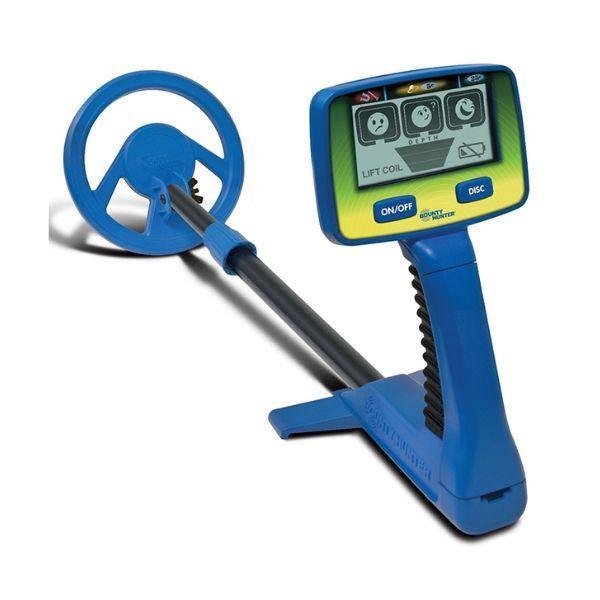
Designed for younger kids from 5 years and up, the Bounty Hunter Jr Target ID Metal Detector is a fun and simple detector that will allow your little one to get a basic understanding of metal detecting.
While it is bright and colourful, the Jr Target ID certainly isn't a toy. It has some very advanced technology inside its cheerful exterior, so your youngster will have endless fun digging up some very cool finds.
For more information on the Bounty Hunter Jr Target ID Metal Detector
3. Bounty Hunter Tracker IV
A classic design and super powerful for it's class, the Bounty Hunter Tracker IV Metal Detector is suited for older kids, teens and adults alike. It has a simple analogue display and allows you to easily adjust settings to suit different ground conditions.
It comes with 3 detecting modes, All Metal, Tone and Full Discriminate so it can be used on pretty much any terrain type.
For more information on the Bounty Hunter Tracker IV Metal Detector
4. Teknetics Digitek Metal Detector
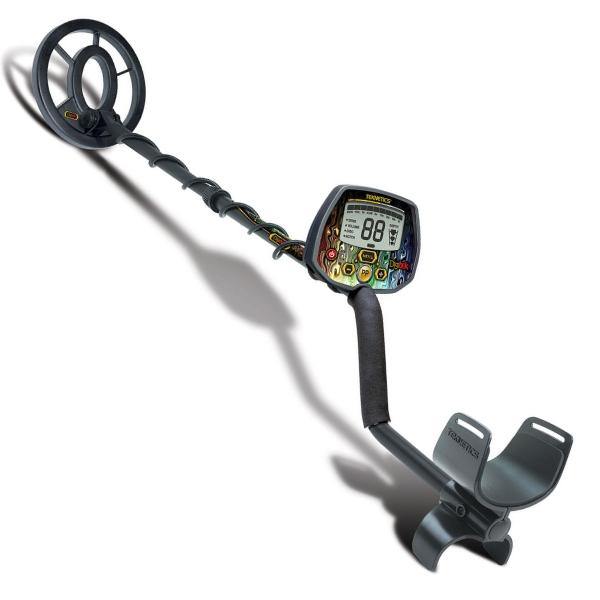
Designed for older kids and teens to have a powerful yet easy to use metal detector. Best suited for parks, fields, camping and dry sand, your child will be able to find coins, relics, jewellery and treasure.
It is a very simple metal detector to use but is packed with loads of features that will really help hone their metal detecting skills.
For more information on the Tekentics Digitek Metal Detector
5. Minelab Vanquish 340 Metal Detector

This multi frequency metal detector is great for teens and adults alike. Simple to use yet extremely powerful, the Minelab Vanquish 340 Metal Detector will make short work of any site. Beaches, parks, fields and scrub, it can handle almost any terrain.
Having a very user friendly interface, you can select the type of target you are looking for and away you go or you can dig into the settings and adjust to your liking.
For more information on the Minelab Vanquish 340 Metal Detector
Ok, so that’s the kids covered but what is the best beginner Metal Detector for adults?

So you have seen the shows on TV and YouTube, watched the guys and girls pulling up cool finds in parks and on the beach and now want to find your own hidden treasures. But you are not quite sure what metal detector to buy. Don’t worry, we are here to help. We have cherry picked the best beginner metal detectors for you.
Best Beginner Metal Detectors for Adults
1. Minelab Vanquish 540 Metal Detector
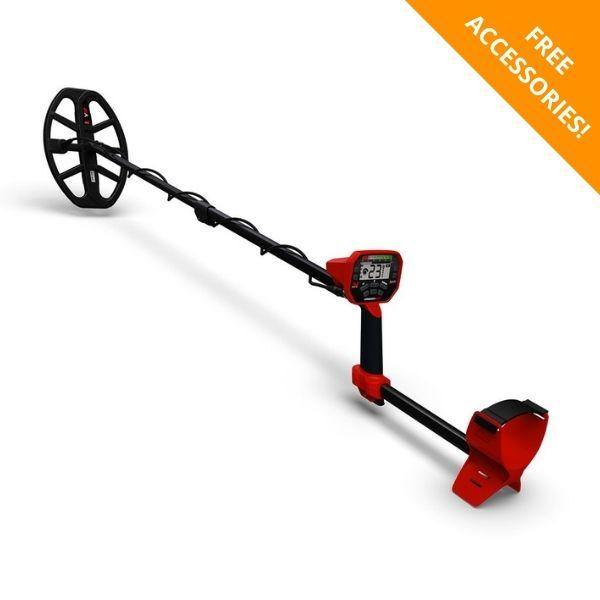
The Minelab Vanquish 540 is one of the best beginner metal detectors on the market. Designed for ease of use for those just starting out but with all the features experienced detectorists expect in a metal detector.
The Vanquish 540 performs exceptionally well on dry ground like parks and fields,and with it's Minelab Multi IQ technology, it performs extremely on wet sand and salt water! It has excellent depth and is sensitive to very small targets like old coins and jewellery.
For more information on the Minelab Vanquish 540 Metal Detector
2. Minelab Vanquish 440 Metal Detector

The Minelab Vanquish Metal Detector is a serious yet virtually automatic treasure hunting detector. While being a great beginners metal detector, it is a really powerful and feature packed machine that will make you feel like an expert very quickly.
Using Minelab’s Multi IQ technology, the Vanquish 440 can handle virtually any ground conditions you can throw at it.
With a very user friendly interface, the ability to edit settings (should you wish to), and some very hi-tech features, the Minelab Vanquish 440 is an excellent choice for someone wanting to get more out of this hobby.
For more information on the Minelab Vanquish 440 Metal Detector
3. Bounty Hunter Lone Star Pro Metal Detector
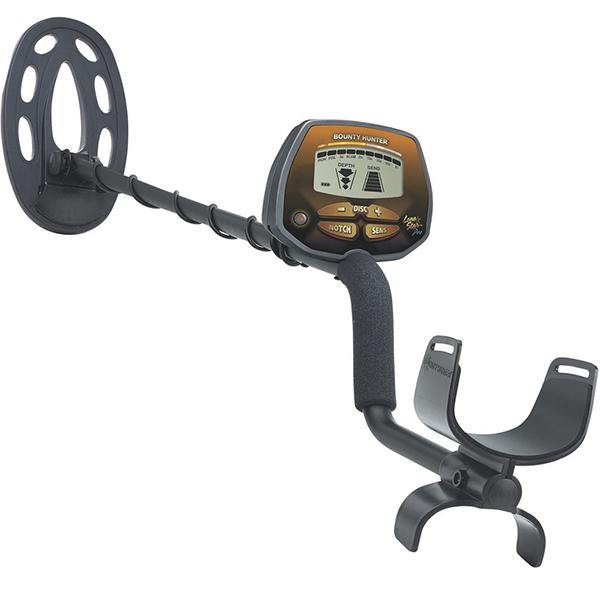
One of the most popular beginner metal detectors, the Lone Star Pro lets you really learn and develop your skills as a detectorist. While being a very simple detector to use, it allows you to manually adjust settings so you can get the most out of the ground you are searching in.
If you are just starting out and want a detector that is excellent to develop your skills, then the Bounty Hunter Lone Star Pro Metal Detector is a brilliant choice.
For more information on the Bounty Hunter Lone Star Pro Metal Detector
Minelab Go-find 66 Metal Detector
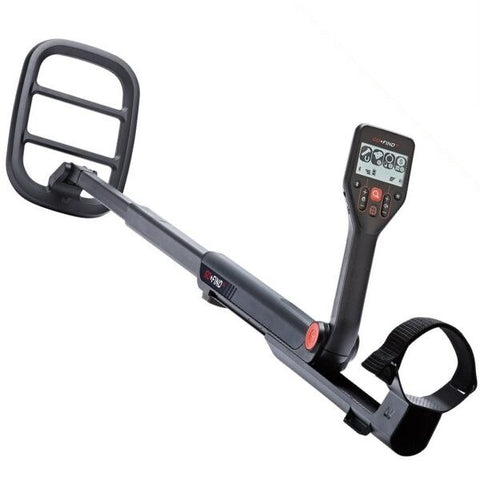
The top of the Go-find range, the Minelab Go-find 66 Metal Detector is a really compact, go anywhere metal detector. Suited for busy people who like to get out detecting in their spare time, or want a compact and sturdy machine to take away camping.
The Go-find 66 is one of the most powerful and easy to use metal detectors in its class. If you want a metal detector that you can just turn on and go then the Minelab Go-find 66 is a very good way to start. You will find your first coin or lost treasure in no time.
For more information on the Minelab Go-find 66 Metal Detector
What is the best metal detector for gold if you are on a budget?
We get asked this question all the time. As discussed above, PI Detectors are rather costly. If you are just starting off, we recommend going for a more affordable and versatile option as listed below.
1. XP ORX Gold and Metal Detector
The XP ORX is by far the best value for money gold and metal detector for those that want a super easy to use machine without skimping on power. The ORX out performs all other entry level gold detectors on the market. It is completely wireless, so there are no cables to deal with and with its pre programmed settings you just need to turn it on and start detecting.
Its selectable frequencies from 13-81kHz will help you find large gold to the smallest nuggets that other detectors will miss. The ORX works very well on mineralised ground and its fast response time easily sorts out the gold from junk.
The other great thing about the XP ORX is that it an amazing coin, relic and beach detector so you can use for all detecting styles and on any terrain including wet sand.
For more information on the XP ORX Detector
![]()
2. Teknetics G2+ Gold and Metal Detector
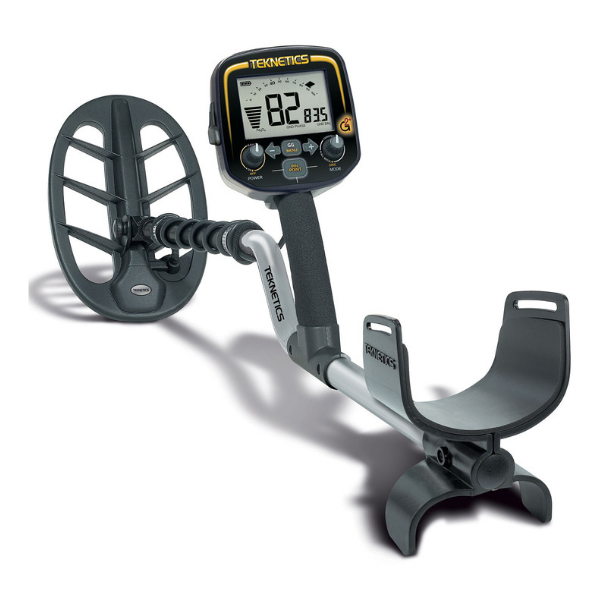
The Teknetics G2+ is a very versatile metal detector and is a great option if you want to do all kinds of metal detecting, including gold prospecting. It can detect small nuggets and handles mineralisation found in goldfields well.
It is an excellent all rounder and can also be used on the beach in wet or dry sand and has a waterproof search coil for shallow water detecting.
The G2+ is packed with hi-tech components and is one of the best multi purpose metal detectors on the market. So if you want to add some gold detecting into the mix then the G2+ is an affordable and versatile option.
For more information on the Teknetics G2+ Metal Detector
3. Teknetics T2 Special Edition Gold and Metal Detector
The Teknetics T2 Special Edition is another great model from the team at Tenknetics. It's suitable for gold prospecting as well as coin and relic detecting. This edition comes with 2 coils, one for larger, deeper targets and a smaller sniper coil for smaller nuggets and more sensitive targets. For a limited time it also comes with a bonus pinpointer to help speed up your target recovery.
For more information on the Teknetics T2 Special Edition Metal Detector
20 Must Know Metal Detecting Tips For Beginners
1. Practice at Home Before You Go Out
We all know the feeling; you have a brand new “toy” and just want to get out and use it. But set yourself up for success before you go out detecting for the first time.
Gather some old coins, new coins, fishing sinkers, gold and silver rings, jewellery and any other small metallic items you might have at home. Place them a decent distance apart, in a clear space in your backyard. Placing them on small squares of white paper to start with is a good idea so you can easily see them.
Run your detector over them and get used to the sounds and ID numbers that appear on your screen. It is recommended to write down your target IDs so you get a good understanding of different target types and how they look and sound.
2. Expect to Dig Trash
It’s no secret that there is a lot of trash buried amongst the treasures we discover. Being aware of this fact is important, especially when first starting out metal detecting.
When you go out detecting you are going to dig loads of junk to get to those sweet, sweet treasures. All of us do but it is part of the hobby and it makes finding a cool target so much more rewarding … and addictive.
So be patient, set realistic goals, learn your detector as much as you can at home, and use your backyard as a training ground.
It is important to not beat yourself up or get discouraged when you have a day of only finding junk. We all have those days. You are not doing something wrong, your metal detector isn’t broken, you are learning and honing your skills. Even the best of the best sites have plenty of junk in them. Which brings us to tip number three.
3. Research, Research, Research!
Once you have the hang of your new metal detector and are ready to go out, it’s time to research the site you have picked. Try and find old articles about the area, get local knowledge, phone up the local community information centre or see if the area has a Historical Association website.
Pop in to the local council or library and see what information you can find out. Use websites like www.trove.nla.gov.au to find old articles, maps and photos of the area. The more information you have the better your chances are of finding great targets.
4. How to pick a site
Picking a site to metal detect isn’t as hard as you might think. One of the most obvious places to go metal detecting is the beach. Beach metal detecting is one of the most lucrative places to go for a hunt. In fact more valuable finds are found on Aussie beaches than anywhere else. Just make sure you are using a suitable Beach Metal Detector.
Other places that are great detecting grounds are old sports grounds. Here you can find old and new coins, plus all sorts of old relics, jewellery and treasures. One tip is to detect around old shady trees, as people would have gathered around them as they watched sport.
Try detecting around and close to fence lines and anywhere people would have gathered back in the day. Please remember not to detect on the actual sports field as this is a big no no and can give the hobby a bad reputation.
Old Public Parks are another excellent location to use your metal detector. Have a look online to find some parks near you. Then research any information about that park and find out when it was established.
The older the better - really old parks can mean really old finds. A good indication of how old a park is, is to look for large, old species of introduced trees such as Pepper Trees and Old Oaks.
Detect around and under benches as well as any old rotundas or shelters. If you have found a good site, you can return multiple times to ensure you cover all the possible finds.
Don’t rush, be methodical and be there as long as you can but don’t feel like you have to do the whole place in one go. Good sites often keep offering up goodies time and time again so be persistent so you don’t miss anything.
Before going out, check with your local council to make sure the area you intend to detect is not off limits.
5. Learn How to Dig a Proper Plug
A plug is the hole you dig when digging up a target. Getting this right is crucial to the hobby as a nice neat plug means us detectorists don’t get a bag rap. Nobody wants to see a site left messy and untidy, especially in parklands. So how to dig a plug properly is really important.
To dig a good plug first pinpoint the centre of your target. Once you are confident that you are right on top of your target, mark the location with your toe so you don’t lose it. With your digging tool dig three quarters around your target, leaving the last quarter as a flap.
Use an old tea towel or pillow case and place that on the ground next to the plug. Fold over the top of the plug exposing the dirt below. Pile any dirt you dig out onto your tea towel or pillow case.
Once you have found your target, lift your tea towel/pillow case and pour the dirt back in the hole, flip the top of the plug back over and pat the plug down, making sure all is neat and tidy. That’s it, super simple.

Sometimes you will find that you can’t dig a plug, like in a forest or in rocky ground, and will have to dig a decent size hole. No stress, no one is judging you - just make sure you back fill it properly, leaving your site the way you found it.
Here is a great video that explains it in more detail.
6 Dig Everything
Part 1: When you first start off it is going to take you some time to get to know your sounds and numbers that your detector is producing. So it is best practice to dig every signal until you get a really good feel for what you are finding.
Yep, you are going to dig loads of pull tabs, bottle tops, foil and other junk. But you are training your ears and senses to begin to recognise what is a good target or junk. Also digging everything can often lead to some awesome finds.
Part 2: Dig those Jumpy Signals - As you get better at knowing your targets you start to learn what to dig and what to leave. BUT sometimes you will get a jumpy signal and it is very tempting to put it down to junk and not dig it up.
However these signals can often mean there is a good target above, below or next to a junk target. So digging these jumpy signals can sometimes lead to finding some very cool targets.
7. Dig After Rainfall
After a good downpour is one of the absolute best times to go metal detecting. This is because the water has soaked deep into the ground, making the ground more conductive.
Having ground that is more conductive means that your metal detector will be much more sensitive to targets. This not only means that you will be able to hit more targets but you will also get more depth when you are detecting. Win win.
8. Take the Trash With You
Did I mention that you will be digging up some trash? Well you will and the unwritten rule is to take it with you. So be prepared and have a bag that you can put those pull tabs and bottle tops into.
Don’t leave them there for someone else to pick up and don’t put them back in the hole for someone else to dig up … again. Dispose of them properly and you will be able to give yourself a little pat on the back for doing the right thing.
Having a bag of trash on you can also be very handy. No matter what you do there are times when you come across a person who just has to put their nose in your business.
If you ever come across someone not happy with you detecting in a certain place you can not only show them your super neat plug but show them the bag of trash you are removing from their area. Double pat on the back for you.
Author’s note: In all my years of metal detecting, I have never had anyone come up to me to complain but we all hear stories, so it’s a nice little card to have up your sleeve.
9. Take Spare Batteries
When you are out metal detecting and are on a roll but are forced to stop because your batteries are flat it is extremely frustrating, to say the least. If your metal detector uses removable batteries, make sure you have a spare or two in your pack.
10. Double Check Your Holes
Believe it or not, having more than one target in the hole is quite common. So it is always good to have another swing after finding your target to make sure you haven’t left something behind.
11. Join a Metal Detecting Club
Whether you are a beginner or have been detecting for years, joining a club is a lot of fun. You meet like minded people, get to try other metal detectors and will learn so much more about this hobby than you will going it alone.
12. Detect At Night
Get yourself a high quality LED Headlamp and add another dimension to your metal detecting. Night detecting is a lot of fun and is good to do with friends and clubs. If you like metal detecting on beaches, being able to catch those late night or pre-dawn low tides can really lead you to some amazing finds.
13. Size Doesn’t Matter
There will be times when you are out metal detecting and come across other detectorists with bigger coils and detectors and you might feel outdone. But size really doesn’t matter, everyone has their own preferences and there is no right or wrong.
What is important is being outdoors and having fun. I have seen plenty of people outdone by detectorists with cheaper, smaller machines and no one was bothered.
14. Use Headphones on the Beach or in Public Places - While headphones are not essential to use a metal detector, they can be very handy.I love using headphones when metal detecting for a few main reasons; you can hear even the faintest signal that you might miss without them, and they are great to phase out unwanted noise such as wind and waves.
Plus, detecting can be a noisy business so using headphones can be more respectful for other people when in public places such as parks and beaches. All metal detectors have a built-in speaker, and those high pitched sounds aren’t necessarily what other people want to hear.
Pop on some headphones and you can do your thing without disturbing others doing theirs.
15. Take Water and Food
Sometimes you can be out for hours on end so having water and something to eat is really important, especially if you are out in the bush. Even if you are detecting a suburban park, having water and food means that you don’t have to stop detecting so you can find a shop to get a drink or something to eat.
16. Let Someone Know Where You Are Going
Metal Detecting can take you to some beautiful parts of our country but as we all know, it doesn’t take long to get somewhere pretty remote and isolated.
When in the bush or old mining areas you can be exposed to open shafts, inclement weather and animals, so it’s important to let someone know where you’ll be heading before you set off - just to be safe.
17. Overlap Your Swing - It is easy to get excited when you get out detecting and it can be tempting to try and cover as much ground as fast as possible. But by going slow and steady and overlapping your swings, you have the best chance of getting everything out of the ground.
18. Go Low and Slow
When you swing your detector, don’t swing it around wildly or in fast movements. Swing your coil as close to the ground as possible, keeping your coil parallel to the ground and swing in slow, controlled arcs.
Skid Guards or Coil Covers can be used to protect your coil so you can swing right on top of the ground without damaging your search coil. Once you have covered an area, don’t be afraid to go back over it from a different direction.
This gives you the best chance of making sure there wasn’t a sneaky little target hiding from you. Detect in grid patterns and try to pick out small sections of ground to go over at a time. This way you will cover the ground thoroughly and have the best chance of finding everything there.
19. Use a Pinpointer
Pinpointers are a mini, handheld metal detector that will help you find your target much faster after digging your plug. Generally your hole will not be big enough to fit your search coil in.
Having a Pinpointer means that you can search in a small place and quickly find the target and save some valuable metal detecting time. Pinpointers make a noise and most will also vibrate so even with headphones on you know where your target is. The closer your pinpointer is to the target, the louder the noise or stronger the vibration becomes.
20. Make Up a Compact Metal Detecting Kit
Being prepared and having a kit with all of your favourite tools inside, ready to go, means you will never accidentally leave something at home. Whether it’s a Backpack or a Finds Pouch, having everything together will save you time so you can be out detecting for longer.
Metal Detector Frequently Asked Questions
Q: What is the best Metal Detector for Treasure Hunting?
A: For treasure hunting the best metal detectors to use are lower frequency, VLF metal detectors. This is because of the discrimination functions they have that can cut out unwanted targets like iron and trash.
Q: What is the best Metal Detector for Gold Detecting?
A: If you are looking for gold and are not limited by budget then a Pulse Induction metal detector is a great choice. If you do not have loads of cash and want to find gold but also coins, relics and treasures then a high frequency VLF metal detector suitable for gold detecting is a much more affordable and versatile way to start.
Q: What is the best Metal Detector for Beach Detecting?
A: Most people who metal detect on beaches use a VLF Metal Detector suitable for beach conditions. While most metal detectors can handle dry sand, wet sand has a much higher mineral content so having a detector with features like Ground Balance will help you adjust your metal detector to the mineral content in the sand. This makes for excellent beach detecting. Pulse Induction detectors do not have an issue with mineralisation but due to their high cost they are not the most common detector used in beach treasure hunting.
Q: What Equipment Do I Need for Metal Detecting?
A: For treasure hunting you will need a good quality digging tool, a finds pouch for your targets and a rubbish bag to dispose of the trash. An optional extra - but extremely handy - is a pinpointer to make finding your targets much faster and easier. Headphones are also optional but recommended, especially when metal detecting in public places.
For beach detecting the above also applies but in addition you will need a good quality sand scoop. A sand scoop has holes in it to allow water and sand to fall through while keeping your target safely secured.
For gold detecting you will need a compact pick or mattock, plastic detecting scoop, optional but handy pinpointer and a finds and trash bag.
Q: Can Metal Detectors be used in water?
A: Nowadays all quality metal detectors come with waterproof search coils. While the search coil and shaft are waterproof, it is important to note that unless otherwise stated, the control box is not waterproof so can not be submerged. There are metal detectors specific for underwater use if you want to be able to submerge the whole detector.
Q: Are Metal Detectors Hard to Use?
A: Today’s VLF metal detectors are designed to be very user friendly. Many are literally ‘Turn On and Go’ detectors that require no previous knowledge of metal detecting. Others with more hands on features are still designed to be easy to use and learn. Almost every model has LED screens that display what your target is likely to be, and have metal discrimination so you can cut out unwanted targets which make them quick and easy to learn and use.
Pulse Induction metal detectors can be a harder nut to crack. As you do not have descrimination or on-screen display they can take a while to get used to and can be much harder to master.
Q: Can Anyone Use a Metal Detector?
A: Using a metal detector does not require a high level of fitness or strength, making them an ideal tool for anyone wanting to get outdoors and participate in some activity in the fresh air. VLF metal detectors are extremely light, making them easy for people of any age to use, from kids as young as 5 years old all the way to people in their 80s and 90s.
Q: Can all Metal Detectors Find Gold?
A: While gold is conductive making it detectable to any metal detector, not all metal detectors can handle high ground mineralisation that can be found in some gold bearing ground. A metal detector that isn’t built for gold detecting can become chatty or noisy and can give false signals in these types of ground, so it is important to select a metal detector that is suitable for gold detecting.
Q: Do I Need a Permit to Detect Gold in Australia?
A: Every state in Australia has different rules and regulations, which are important to be across. Most states will require a small nominal fee for prospecting. Below is a list for each state's referring websites where you can find out more.
SA : https://www.energymining.sa.gov.au/minerals/exploration/fossicking
VIC : https://earthresources.vic.gov.au/licensing-approvals
NSW : https://www.service.nsw.gov.au/transaction/apply-permit-fossick-nsw-state-forest
QLD : https://www.qld.gov.au/recreation/activities/areas-facilities/fossicking
NT : https://fossicking.nt.gov.au/application-forms
WA: https://www.dmp.wa.gov.au/Minerals/Prospectors-fossickers-1525.aspx
TAS: https://www.mrt.tas.gov.au/prospecting_and_fossicking
ACT : There is little government information on fossicking in the ACT. As the vast majority of Australia’s Capital Territory is covered by the Namadgi National Park, there are not many permissible prospecting areas. Most serious gold prospectors venture off to NSW. Another option is to do permission detecting. This is where you get a landowner’s permission to detect on their property.

